Is life fair or unfair?
I mean really, which is it? It's got to be one or the other, right? Law of the Excluded Middle, and all that?
-----
I love this question, because I can argue equally sincerely either Yes or No. It's not that my opinions are inconsistent. It's not even that the word fair has two different meanings, though I guess the shadings of meaning are not quite the same in the two cases. No, it's a choice based on pure pragmatics. What am I trying to do with the answer? What is the questioner going to do with what I tell him? What is he really asking?
-----
On the one hand, we are all told that life isn't fair. Everybody knows this. It's hardly news. Bad things happen to good people; virtue suffers while vice triumphs. People have known this for a long time. Well over two thousand years ago, Kohelet, a son of King David, wrote:
I returned, and saw under the sun, that the race is not to the swift, nor the battle to the strong, neither yet bread to the wise, nor yet riches to men of understanding, nor yet favour to men of skill; but time and chance happeneth to them all. (Ecclesiastes 9:11)
-----
On the other hand, we are also told that you get out of life what you put into it — which is another way of saying that life is fair, after all. Yes, accidents happen. Yes, there is horrible injustice. Since we know that in advance, we can prepare for it. And if you know that there's a chance of something bad happening but you take no steps to protect yourself, ... how exactly is it unfair when the disaster finally comes?
Of course there has to be a little leeway in this position. If a whole population is oppressed or held in servitude, it's a little harsh to say that it's their own fault for not taking the steps to free themselves.* For various reasons they might be literally unable to do so. And it's equally callous to suggest a man is at fault for not buying an expensive insurance policy when he has but two cents to his name. You can't reasonably ask someone to do everything for himself in all possible circumstances, because for any individual you care to name — be he never so heroic — it is possible to construct circumstances that are stacked so far against him that he cannot prevail. Even Superman is undone by kryptonite.
-----
But in normal, workaday circumstances, you can oscillate between the two positions almost frivolously, without any sense of inconsistency. Let's say your friend is looking for a job, and has two different interviews lined up today. After the first one, he says that by bad luck it just so happened that the Perfect Applicant walked in an hour earlier, so the company hired him on the spot and turned your friend away without even interviewing him. Right away you say, "Wow, that really is bad luck. Life is so unfair."
Then after the second interview he tells you that it turns out the company absolutely requires applicants to have a certain certification that your friend doesn't have. They said so explicitly in the advertisement, but your friend admits he didn't read it all. And so they threw him out with some harsh words about his wasting their time. This time you say, "I'm really sorry it didn't work out for you, but what were you thinking? You applied for the job without even reading the complete advertisement? No wonder they were annoyed. It's only fair. If you don't look where you're going, you'll bump into things. Life's like that." In the space of five minutes you have told your friend both that life is unfair, and that life is fair. And you meant it both times.
It's just a really funny question to ask.
__________
* To be sure, the sheer pointlessness of such an accusation didn't stop Ezra Pound from making it. Till now I have not traced the quote to its source, but he is said to have written, "A slave is one who waits for someone to come and free him."

